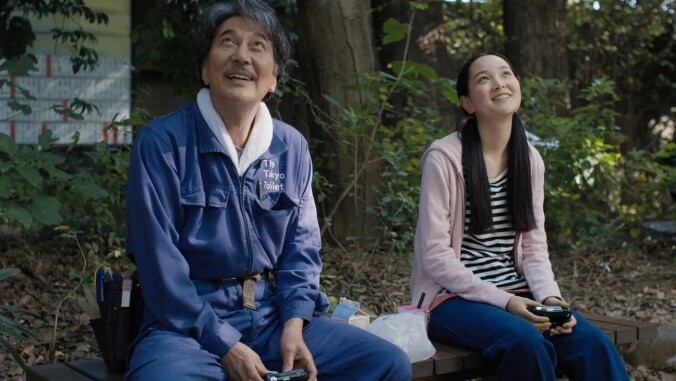Perfect Days review: Wim Wenders' sweet and simple return to form
Koji Yakusho gives an engrossing performance as a Japanese janitor

In Perfect Days, the camera follows a man as he goes about his morning. Getting up, brushing his teeth, shaving, watering his plants, dressing, going to work. The question on the audience’s mind is, of course, who is he? The man observed silently going about his daily routine is Hirayama (Koji Yakusho), a Tokyo toilet cleaner with a penchant for playing classic songs collected on cassette tapes, reading many books, and taking photos of city parks. As the onion is peeled further we discover that he is estranged from his family and past. Though Perfect Days never reveals the specific details of Hirayama beyond what happens in the few days we spend in his company, by the end of the film, a full portrait of a life is beautifully realized.
Marking a return to form for legendary German filmmaker Wim Wenders (Wings of Desire, Paris, Texas), Perfect Days’ style is patient, observational, and unobstructive. Nothing much happens, yet everything does. Hirayama continues with his day; finishes work, goes to a bathhouse to clean, and to a bar for a respite with company. At work, he interacts with a chatty younger colleague (Tokio Emoto). And even then the audience gets to know more about his colleague than Hirayama.
Later in the film his niece (Arisa Nakano) visits and a window opens into why he might be isolated. But Wenders and his co-screenwriter Takuma Takasakiare are mostly concerned with the present. The past is alluded to but never becomes the focal point. To those looking from the outside, Hirayama’s life seems small, insignificant. Perhaps it was grander, fuller before. To him, this is what he wants. He loves the simplicity and we as the audience watching him fully appreciate that.
Yakusho makes for a subtle, uncomplicated but totally compelling screen presence. The character is always calm and the actor’s features are opaque for the most part. Yet as his face fills the screen and his watchful eyes look at the other actors, Yakusho ably telegraphs what this mostly silent man is thinking. He’s in every frame of this film, yet the audience never tires of watching him. It’s inexplicable and totally engrossing.
























![Rob Reiner's son booked for murder amid homicide investigation [Updated]](https://img.pastemagazine.com/wp-content/avuploads/2025/12/15131025/MixCollage-15-Dec-2025-01-10-PM-9121.jpg)















